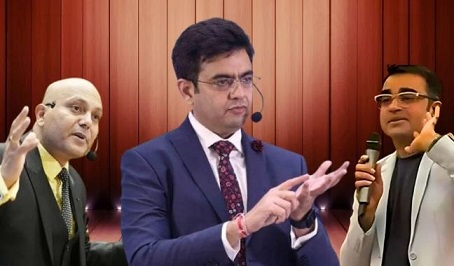Stories you may like
Motivational Speaker
A motivational speaker specializes in delivering inspiring and uplifting speeches or presentations with the aim of motivating and energizing individuals or groups. These speakers often draw on personal experiences, anecdotes, and motivational principles to connect with their audience and encourage positive changes in mindset and behavior. Their messages are designed to inspire confidence, boost morale, and foster a sense of purpose, both in personal and professional aspects of life.
Motivational speakers can be found across various fields, including business, education, sports, and personal development. They are often invited to speak at conferences, seminars, workshops, and corporate events to share their insights and strategies for overcoming challenges, setting and achieving goals, and maintaining resilience in the face of adversity. The impact of a motivational speaker lies in their ability to connect emotionally with their audience, offering valuable perspectives and tools that empower individuals to take positive action and pursue their aspirations with renewed vigor.
Motivational speakers inspire and encourage people to take action towards their goals and aspirations. They provide a source of inspiration, guidance, and motivation, helping individuals to overcome obstacles and challenges that may be holding them back. By sharing their own experiences, insights, and expertise, motivational speakers can provide a new perspective and empower their audiences to take control of their lives and achieve their full potential.
Duties and Responsibilities
The duties and responsibilities of a motivational speaker are multifaceted and involve various aspects of preparation, presentation, and interaction with the audience. Here are key responsibilities associated with being a motivational speaker:
- Research and Content Development: Conduct thorough research on the audience, event, and industry to tailor the speech to the specific needs and interests of the audience. Develop engaging and relevant content that aligns with the theme or purpose of the event.
- Public Speaking Preparation: Rehearse and refine the delivery of the motivational speech, paying attention to tone, pace, and body language. Familiarize oneself with the venue and technical aspects of the presentation, such as audiovisual equipment.
- Audience Engagement: Connect with the audience on a personal level by using relatable anecdotes, real-life examples, and interactive elements. Encourage audience participation through questions, discussions, or activities to enhance engagement.
- Inspiration and Empowerment: Deliver a motivational message that inspires and empowers the audience. Provide actionable insights, strategies, and tools that individuals can apply to their personal or professional lives.
- Adaptability: Be adaptable to different audience demographics and cultural backgrounds. Modify the content and approach to resonate with diverse groups and address specific challenges or concerns.
- Professionalism and Ethics: Uphold a high level of professionalism and ethical standards in all aspects of the speaking engagement. Respect confidentiality and ensure that the content aligns with ethical guidelines.
- Marketing and Self-Promotion: Actively engage in marketing efforts to promote speaking services. This may involve maintaining a professional website, leveraging social media, and networking within relevant industries to secure speaking engagements.
- Client Communication: Effectively communicate with event organizers, clients, and stakeholders to understand event objectives, logistics, and any specific requirements. Ensure clear communication regarding expectations and deliverables.
- Feedback Incorporation: Collect and analyze feedback from audiences to continually improve presentations. Adjust content, delivery methods, or topics based on audience responses and evolving needs.
- Time Management: Manage time effectively during presentations, ensuring that key messages are conveyed within the allocated time frame. Respect event schedules and contribute to the overall success of the program.
- Networking: Build and maintain a professional network within the speaking industry, collaborating with event planners, agents, and fellow speakers. Networking can lead to additional speaking opportunities and exposure.
- Crisis Management: Be prepared to handle unexpected challenges or crises during events, such as technical issues, sensitive audience reactions, or disruptions. Maintain composure and address issues professionally.
Workplace of a Motivational Speaker
The workplace of a motivational speaker is dynamic and diverse, as their engagements often take them to a variety of venues and settings. Unlike a traditional office environment, a motivational speaker's workplace includes stages, conference halls, seminar rooms, and event spaces where they deliver their presentations. Travel is a significant aspect of their work, as they may be invited to speak at conferences, corporate events, educational institutions, or community gatherings across different cities, states, or even countries.
Preparation for a speaking engagement is an essential part of the motivational speaker's work environment. This involves researching the specific audience, tailoring the content of their presentation, and rehearsing their delivery to ensure it resonates effectively. Additionally, speakers often engage in networking activities with event organizers, fellow speakers, and industry professionals, creating opportunities for future speaking engagements.
While not tied to a conventional office, the workplace of a motivational speaker is wherever they can connect with an audience, share their message, and inspire positive change. It requires adaptability, effective communication skills, and the ability to thrive in diverse and sometimes unpredictable environments.
How to become a Motivational Speaker
Becoming a motivational speaker involves a combination of personal development, honing your communication skills, building a unique brand, and actively seeking speaking opportunities. Here is a guide on how to become a motivational speaker:
- Identify Your Niche and Message: Define the specific area or topic you are passionate about and want to focus on. Clearly articulate the message you want to convey to your audience.
- Develop Your Speaking Skills: Work on enhancing your public speaking skills. Join public speaking groups, like Toastmasters, to practice and receive feedback. Attend workshops to refine your techniques.
- Craft Compelling Content: Create engaging content for your speeches. Emphasize storytelling, relatable anecdotes, and actionable insights to connect with your audience.
- Create a Personal Brand: Establish a personal brand that reflects your message, style, and expertise. Develop a professional website, craft a compelling bio, and build a presence on social media.
- Gain Experience: Start speaking at local events, community gatherings, or workshops. Offer your services pro bono initially to gain experience and build a portfolio.
- Create a Speaker Reel: Record your speeches to create a speaker reel. This visual representation showcases your speaking style and impact, serving as a valuable tool for attracting potential clients.
- Network within the Industry: Attend events, conferences, and network within your industry. Connect with event organizers, fellow speakers, and professionals to expand your opportunities.
- Secure Speaking Engagements: Approach event organizers, conference planners, and educational institutions to secure speaking engagements. Provide them with your speaker reel, testimonials, and a clear outline of your message.
- Utilize Online Platforms: Leverage online platforms to increase your reach. Create content on social media, start a YouTube channel, or host webinars to showcase your expertise.
- Seek Professional Representation: As your career progresses, consider seeking representation from speakers' bureaus or agencies to help secure higher-profile engagements.
- Continuously Evaluate and Improve: Solicit feedback after each speaking engagement to identify areas for improvement. Continuously evaluate your performance and refine your message and delivery accordingly.
- Invest in Marketing: Develop a marketing strategy to promote your speaking services. Utilize email campaigns, content marketing, and collaborations with influencers or organizations aligned with your message.
- Stay Persistent and Resilient: Building a career as a motivational speaker takes time and persistence. Be prepared for setbacks, use challenges as opportunities to learn and grow, and stay committed to your message.
Workshops
There are numerous workshops and training programs designed to help motivational speakers enhance their skills, build their brands, and navigate the speaking industry. Below are examples of workshops that speakers may find beneficial:
- The Professional Speakers Academy (Led by Andy Harrington): This program focuses on developing presentation skills, building a brand, and creating a successful speaking business. It covers topics such as structuring a speech, using storytelling and humor, and enhancing stage presence.
- Speaking Empire: Speaking Empire offers various workshops, including the "Speaking and Marketing Academy" and the "Speaker Trainer Experience." These programs cover speaking skills, marketing strategies, and sales techniques.
- Heroic Public Speaking (Led by Michael Port): Heroic Public Speaking provides workshops to help speakers deliver impactful and persuasive presentations. The training emphasizes authenticity, connection with the audience, and effective storytelling.
- Transformational Speaker Training (Led by Eric Edmeades): This workshop is designed to help speakers find their authentic voice and communicate their message with clarity and impact. It covers aspects like developing a powerful story and connecting with the audience.
- The Speakers Institute: The Speakers Institute offers training programs for speakers, including workshops on public speaking, presentation skills, and business development. It aims to empower speakers to excel in their speaking careers.
- The SpeakUp Challenge (Led by Tricia Brouk): This workshop focuses on helping speakers refine their message, enhance their delivery, and build confidence. It includes practical exercises and techniques to improve overall speaking effectiveness.
- Craig Valentine's World Class Speaking Coaching Program: Led by Craig Valentine, a World Champion of Public Speaking, this program provides coaching and workshops to elevate speaking skills, including crafting impactful messages and engaging with diverse audiences.
- Stage Time University (Led by Darren LaCroix): Stage Time University offers a range of speaking programs, including workshops on storytelling, humor, and connecting with audiences. It aims to equip speakers with the tools to deliver compelling presentations.
- Story Theater International (Led by Doug Stevenson): This workshop focuses on the art of storytelling for speakers. It helps participants craft and deliver compelling stories that resonate with audiences and enhance the impact of their messages.
- The Message of You (Led by Judy Carter): Judy Carter's workshop helps speakers identify their unique message and brand. It covers storytelling techniques and strategies to create memorable and impactful presentations.
Key skills needed for a Motivational Speaker:
1. Communication Skills
- Strong public speaking ability with clear articulation.
- Storytelling skills to connect emotionally with the audience.
- Persuasive speaking to inspire and influence.
- Ability to adjust tone, pace, and style depending on the audience.
2. Confidence and Stage Presence
- Charisma and self-assurance to hold attention.
- Body language, gestures, and voice modulation for impact.
- Ability to manage stage fright and project authority.
3. Emotional Intelligence
- Understanding audience needs, moods, and reactions.
- Empathy to connect deeply and authentically.
- Active listening and responding to audience feedback.
4. Content Development Skills
- Crafting powerful speeches, anecdotes, and messages.
- Ability to research, organize, and structure presentations.
- Storytelling through personal experiences, case studies, or real-world examples.
5. Persuasion and Influence
- Inspiring people to adopt positive attitudes or actions.
- Using psychology and motivation techniques effectively.
- Encouraging long-term change, not just temporary inspiration.
6. Adaptability and Creativity
- Flexibility to engage different types of audiences (students, corporates, communities).
- Creativity in using humor, visuals, and interactive methods.
- Ability to improvise when things don’t go as planned.
7. Business and Marketing Skills
- Personal branding to stand out in a competitive field.
- Networking to build connections with event organizers, companies, and media.
- Social media presence to reach a wider audience.
- Negotiation skills for contracts, speaking fees, and sponsorships.
8. Resilience and Self-Motivation
- Commitment to continuous self-improvement.
- Ability to handle criticism, rejection, or challenging audiences.
- Passion and authenticity to keep inspiring others consistently.
Salary of a Motivational Speaker
Salaries can vary widely depending on reputation, experience, niche, and audience size. Many speakers work freelance and earn through speaking fees, workshops, books, online courses, or coaching.
United States:
- Beginner: \$500 – \$2,000 per speech
- Mid-level: \$5,000 – \$10,000 per speech
- Top/celebrity speakers: \$20,000 – \$100,000+ per event
- Annual average: \$60,000 – \$120,000 (for active professionals with steady engagements).
India:
- Beginner: ₹10,000 – ₹50,000 per talk
- Mid-level: **₹1 – ₹3 lakhs per talk
- Top names (corporate events/celebrity speakers): ₹5 – ₹20+ lakhs per talk
- Annual range: ₹5 – ₹20 LPA (can go much higher for famous speakers).
United Kingdom:
- Typical speaking fee: £1,000 – £10,000 per event
- Celebrity speakers: £20,000 – £50,000+ per event
Other Regions:
- Canada: CAD \$1,500 – \$15,000 per event
- Australia: AUD \$2,000 – \$20,000 per event










User's Comments
No comments there.